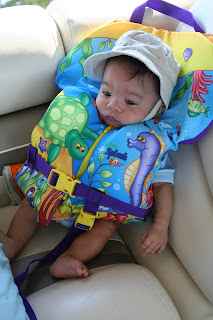
My beautiful big 3 year old boy started preschool following Labor Day which is both a happy and sad occasion for mommy. I am happy that I get him out of the house for a couple of afternoons a week so that there is a
minuscule chance that I can catch up on laundry/clean, etc., but sad to think that he is already old enough to be in preschool. Before I know it we WILL be going to prom together (you don't think that will be awkward for him do you?).
I really love his school,
The Children's Farm (I think their website sucks but am guessing they put all their focus on the kiddies). I had been hearing amazing things about this place since we had moved up here and started thinking ahead to his schooling future. Since it is nearly all outdoors I heard it was great at wearing the kiddies out and God knows that I need that since he has never been a napper. I had also heard that it was nearly
impossible to get into because they only take a handful of kids. I didn't know if I really wanted to try and enroll him this year or wait until next when he would be 4 because I didn't know how nuts things would be with the triplets, etc. I sent in his application (it had to be in by Feb. 1st which was right after the babies came) figuring he wouldn't get accepted but he actually did!
I will write more about the school in a bit. Here are a few photos of him during the first class (which was with mommy).
They feed and water the animals, go on nice walks, grow things in the garden and use them during snack time, etc., ride the horses, do art projects, sing songs... Kind of a non-traditional school but really great nonetheless. I want to go there myself.
Feeding the goats, Sugar and Pepper. They have very soft tongues.

Learning to pump water, and being pleased with his result.




Here are the basics from their site:
AT THE CHILDREN'S FARM,
EARLY LEARNING is important,
and LEARNING BY DOING is basic.
Love of nature and understanding of the interactions of all living things are learned.
There are many outdoor activities in a spacious, aesthetic, natural surrounding and first-hand experiences with the nature cycle in gardening, hikes, wildlife observation, weather, plants and trees, and food.
Enjoyment of and respect for animals is learned, and this knowledge can help children understand their emerging selves and strengthen their ability to love and respect other people.
Many experiences with animals on the farm are provided, including daily chores, baby animals, birth, death, and food production.
Learning how to control their bodies through many kinds of physical activities gives children strength, confidence, and skill that carry over into all areas of development.
There is a large outdoor play area, and climbing, digging, building, swinging, and daily physical fitness activities such as skill-building, movement exploration, or hiking are offered.
Respect, love, and enjoyment of other people are learned gradually as the shild experiences and interacts with an increasingly larger circle of friends and acquaintances.
A homelike environment and small groups (17 in a class with 2 teachers) allow for an informal atmosphere with many opportunities for social interactions.
Self-confidence is learned through developing many skills so the child becomes increasingly self-reliant.
Children are encouraged to dress themselves, prepare food, make choices, take responsibility for their actions, and help themselves and others.
Concepts of space, shape, classification and quantity are learned at an early age as children play with real objects and are guided to see relationships.
Learning through the senses and direct experiences with shapes, number, size differences, and a large variety of manipulative material, much of it found in the natural or home environment, and introduced to the child individually when ready to learn.
Communication skills are basic to future learning and to the child's ability to speak and listen well and are learned as the child is surrounded with language and encouraged to talk.
There are so many activities that are stimulating to talk about! By discussing, questioning, sharing ideas, planning new projects, carrying out directions, books, stories, charts, signs, and children's story telling, children begin to see the written word as an extension of speech and as another exciting way to communicate.
Learning attitudes are developed, and a child's early contact with school is a strong determiner as to how the child views the whole world of school and learning.
Curiosity and initiative are encouraged as a child learns to direct his own learning. Each child's own learning rate and style are respected. Warmth and friendship accompany real enthusiasm for learning.































